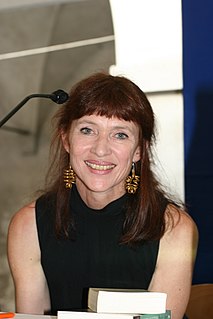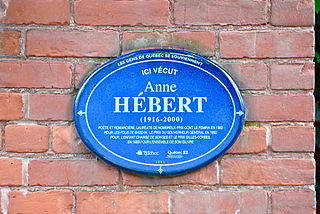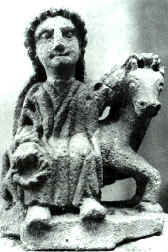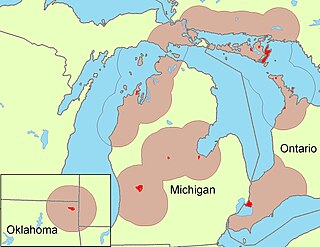
Nancy Louise Huston, OC is a Canadian-born novelist and essayist who writes primarily in French and translates her own works into English.

Canadian–French relations refers to the diplomatic relations between Canada and the French Republic. Both nations enjoy friendly relations, the importance of which centres on the history of French immigration to Canada. Canadians of French heritage make up the majority of native speakers of French in Canada, who in turn account for about 22 percent of the country's total population.

Anne Hébert, was a French Canadian author and poet. She won Canada's top literary honor, the Governor General's Award, three times, twice for fiction and once for poetry.

The Nouveau Roman is a type of 1950s French novel that diverged from classical literary genres. Émile Henriot coined the term in an article in the popular French newspaper Le Monde on May 22, 1957 to describe certain writers who experimented with style in each novel, creating an essentially new style each time. Most of the founding authors were published by Les Éditions de Minuit with the strong support of Jérôme Lindon.

Lise Bissonnette is a Canadian writer and journalist.

Joseph Armand Roch Voisine, is a Canadian singer-songwriter, actor, and radio and television host who lives in Montreal and Paris. He writes and performs material in both English and French. He won the Juno Award for Male Vocalist of the Year in 1994. In 1997 he was made an Officer of the Order of Canada.
Marcel Trudel was a Canadian historian, university professor (1947–1982) and author who published more than 40 books on the history of New France. He brought academic rigour to an area that had been marked by nationalistic and religious biases. His work was part of the marked changes to Quebec society during the Quiet Revolution. Trudel's work has been honoured with major awards, including the Governor General's Literary Award for French Non-Fiction in 1966, and a second nomination for the award in 1987.
Gilbert Simondon was a French philosopher best known for his theory of individuation, a major source of inspiration for Gilles Deleuze, Bruno Latour and Bernard Stiegler.
The Ottawa Journal was a daily broadsheet newspaper published in Ottawa, Ontario, Canada, from 1885 to 1980.

Gallo-Roman religion is a fusion of the traditional religious practices of the Gauls, who were originally Celtic speakers, and the Roman and Hellenistic religions introduced to the region under Roman Imperial rule. It was the result of selective acculturation.

The Ottawa, also known as the Odawa dialect of the Ojibwe language is spoken by the Ottawa people in southern Ontario in Canada, and northern Michigan in the United States. Descendants of migrant Ottawa speakers live in Kansas and Oklahoma. The first recorded meeting of Ottawa speakers and Europeans occurred in 1615 when a party of Ottawas encountered explorer Samuel de Champlain on the north shore of Georgian Bay. Ottawa is written in an alphabetic system using Latin letters, and is known to its speakers as Nishnaabemwin "speaking the native language" or Daawaamwin "speaking Ottawa".

Daniel Turp is a professor of constitutional and international law at the Université de Montréal in Montreal, Quebec, Canada. He served as a Bloc Québécois Member of Parliament (1997–2000) and as a Parti Québécois member of the Quebec National Assembly (2003–2008).

Benoît Pelletier is lawyer, academic, and politician in the Canadian province of Quebec. He was a Liberal member of the National Assembly of Quebec from 1998 to 2008 and was a prominent cabinet minister in the government of Jean Charest. He is best known for promoting the concept of "asymmetric federalism," wherein Quebec nationalism may be incorporated into a decentralized Canadian federal structure.

The Diocese of Nancy and Toul is a Latin Church ecclesiastical territory or diocese of the Catholic Church in France. After a considerable political struggle between Louis XV, Louis XVI, and the Dukes of Lorraine, the diocese was erected by Pope Pius VI on 17 December 1777. The Diocese of Nancy is a suffragan diocese in the ecclesiastical province of the metropolitan Archdiocese of Besançon.

Dimitri Kitsikis was a Greek Turkologist, Sinologist and Professor of International Relations and Geopolitics. He published also poetry in French and Greek.
Finest Kind is a folk music trio based in Ottawa, Ontario, Canada. It consists of Ian Robb, Ann Downey and Shelley Posen. The band is known for its three-part harmony renditions of traditional folk songs.

Marc Lavoie is a Canadian professor in economics at the University of Ottawa and a former Olympic fencing athlete.

Autumn in Peking is a 1947 novel by the French writer Boris Vian. It was published by Jean d’Halluin's Éditions du Scorpion in 1947 with a second edition at Éditions de Minuit in 1956 which had a drawing by Mose on the cover. It was reissued in 1963 and reprinted a number of times. The French critic Bruno Maillé has described it as a surrealist novel, something the surrealists themselves refuted, however Alistair Rolls in his study of intertextuality in four novels of Boris Vian argues the novel contains many surrealist elements and techniques. The Peking of the title is not literal; if anywhere the location of the novel's main action is a “dream-desert” allowing Vian to play with visual extremes of searing light and heat as well as intense blackness and night. It takes place in an imaginary desert called Exopotamie where a train station and a railway line are under construction. Pestereaux argued that Peking was simply slang for Paris; an allegory of Paris post WW2 reconstruction and the insanity of its bureaucracy.













